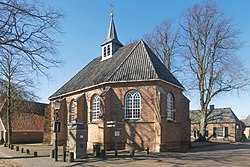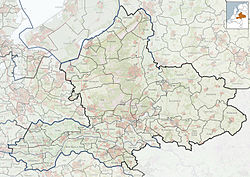Bronkhorst is a village in the municipality of Bronckhorst, Gelderland, the Netherlands. Technically, it is a city (see below) and, with only 157 inhabitants (2010), one of the smallest cities in the Netherlands (after Staverden, Eembrugge and Sint Anna ter Muiden).
Bronkhorst | |
|---|---|
Small city | |
 Church in Bronkhorst | |
Location in the province of Gelderland | |
| Coordinates: 52°05′N 6°11′E / 52.083°N 6.183°E | |
| Country | Netherlands |
| Province | Gelderland |
| Municipality | Bronckhorst |
| Area | |
• Total | 0.13 km2 (0.05 sq mi) |
| Elevation | 9 m (30 ft) |
| Population (2022)[1] | |
• Total | 100 |
| • Density | 770/km2 (2,000/sq mi) |
| Time zone | UTC+1 (CET) |
| • Summer (DST) | UTC+2 (CEST) |
| Postal code | 7226[1] |
| Dialing code | 0575 |
Early history
editThe early history of Bronkhorst is, as is common for Dutch towns, largely unknown. It is possible that in the 7th century farmers settled on and around the hill on which a castle would be built later. The hill formed a refuge amidst the low-lying, fertile clay in the area, which is close to the river IJssel.
Lords of Bronkhorst
editBronkhorst used to be a lordship. The earliest known lord of Bronkhorst was Gijsbert of Bronkhorst (1140), son of Adam of Bronkhorst, first mentioned in 1127. He and some of his descendants played an important role in the politics of the time. The last Bronkhorst, Joost, died in 1553, after which the domain fell to the widow of Georg of Limburg.
Castle
editIn the Middle Ages, a castle was erected on the aforementioned hill. It is first mentioned in a 14th-century document. It consisted of a keep and associated buildings and was surrounded by a thick wall and a wide moat. It was sieged several times, most notably in 1582, when after nine months Dutch troops captured the castle, which was occupied by the Spanish during the Eighty Years' War. The castle changed hands many times, until its last owner, a merchant, had it demolished in 1828.
Town
editIn a document dated 13 March 1482, Gijsbert VII granted city rights to the inhabitants of the village Bronkhorst, which was right next to the castle. Concretely this meant, among other things, that they were given limited self-government and were allowed to administer the law to some extent.
Culture
editBronkhorst is known for its picturesque buildings, and housed a museum dedicated to Charles Dickens which also contained items purchased from the former Dickens museum at Eastgate House in Rochester, Kent.[3]
Gallery
edit-
The Bronkhorst Windmill
-
Windmill information board (in Dutch)
-
Onderstraat 8
References
edit- ^ a b c "Kerncijfers wijken en buurten 2022". Central Bureau of Statistics. Retrieved 22 December 2022.
- ^ "Postcodetool for 7226LA". Actueel Hoogtebestand Nederland (in Dutch). Het Waterschapshuis. Retrieved 20 March 2022.
- ^ "Dickens Museum uit Bronkhorst gered met verhuizing naar Braamt". Gelderlander (in Dutch). Retrieved 20 March 2022.
Further reading
edit- Van Ebbenhorst Tengbergen, E.J. van (1965). Bronkhorst — korte historie van stad en heerlijkheid. Zutphen: Walburg Pers. ISBN 90-6011-496-5. (Book in Dutch discussing the history of the domain, the castle and the village.)
External links
editSee Sources.

